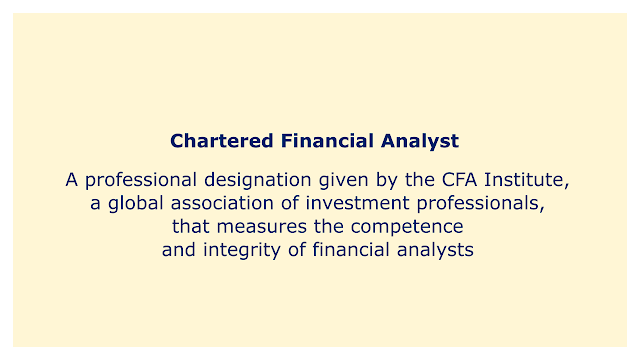 |
| Image: Moneybestpal.com |
The CFA Institute, a worldwide association of investment professionals, awards the professional distinction of "Chartered Financial Analyst" (CFA) to those who have demonstrated their ability and integrity as financial analysts. A CFA charter is a testament to one's proficiency in ethical principles, portfolio management, and investment analysis.
A CFA charter holder must pass three levels of tests covering financial reporting and analysis, corporate finance, economics, quantitative methods, equity, fixed income, derivatives, alternative investments, portfolio management, and ethics in order to obtain the designation. The CFA Institute Code of Ethics and Standards of Professional Conduct must be followed, and one must have at least four years of relevant professional experience in the investing business.
The CFA Program is a demanding self-study course that takes a lot of time and effort to complete. For Level I and Level II, the exams are given once a year; for Level III, they are given twice a year. There are multiple-choice, item-set, and essay questions on the six-hour tests. The passing rates for the tests are often low, and in recent years have ranged from 25% to 55%.
In the international financial business, the CFA charter is well-known and highly regarded. One's credibility, professional network, and job chances may all be improved. The CFA Institute estimates that as of 2022, there would be more than 170,000 CFA charter holders in more than 165 nations and territories. Holders of the CFA charter have jobs in a range of industries, including asset management, banking, consulting, corporate finance, education, and research.
The CFA charter is also current and applicable to the shifting problems and trends in the financial industry. For instance, the CFA Program recently expanded its curriculum to include environmental, social, and governance (ESG) investing, fintech, and cryptocurrencies. To meet the diverse needs and interests of investment professionals, the CFA Institute also provides additional programs and credentials, such as the Investment Foundations Certificate and the Certificate in Investment Performance Measurement (CIPM).
